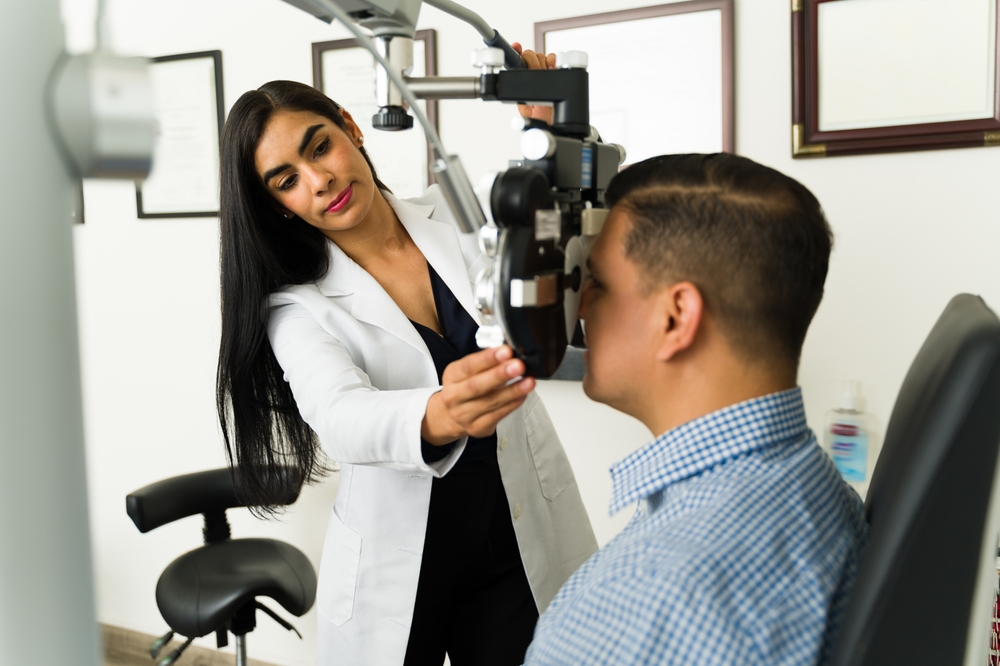6 Ways to Effectively Prepare Before Your Next Eye Exam
July 16, 2024
Having eye exams is an integral part of keeping your eyes healthy. During an eye exam, your eye doctor can check your vision, update your prescription, and screen you for common eye conditions.
Eye exams can save your vision, especially if you're over 40, as older adults are at higher risk for developing eye conditions. Preparation can help you get the most out of your eye exam.
Whether you've kept up with eye exams or are having your first eye exam in several years, there are several ways to be at your best before seeing your eye doctor. Keep reading to learn about 6 ways to effectively prepare before your next eye exam!
What is the Difference Between an Optometrist and Ophthalmologist?
 Their medical knowledge about the eyes and the whole body means they can diagnose and treat eye diseases. Optometrists have attended a school of optometry to obtain an optometry degree, which means they're primarily concerned with assessing your vision, determining if you need glasses or contact lenses, and, if so, figuring out your prescription.
Their medical knowledge about the eyes and the whole body means they can diagnose and treat eye diseases. Optometrists have attended a school of optometry to obtain an optometry degree, which means they're primarily concerned with assessing your vision, determining if you need glasses or contact lenses, and, if so, figuring out your prescription.
However, they also have extensive knowledge about keeping your eyes healthy and common eye conditions and diseases. Optometrists can screen for eye diseases, but an ophthalmologist is needed for an accurate diagnosis and treatment.
For most people without eye conditions, seeing an optometrist is often all they need for routine eye exams to screen for eye conditions, update glasses, and contact lens prescriptions. But if you have an eye condition or your optometrist thinks you have one, you may need to see an ophthalmologist for a medical exam.
You can also talk to your optometrist to find out if they recommend seeing an ophthalmologist, either because of an existing eye condition or a high risk of developing one, or if you're considering a vision correction procedure, which only an ophthalmologist can assess you for and perform.
Know Your Medical and Family Medical History
Before assessing your risk of certain eye conditions, your eye doctor needs to know your medical history and your family's. This is true whether you're seeing an optometrist or an ophthalmologist.
Your medical and family medical history includes any medical conditions you may have, even if they seem unrelated to your vision and how you see. Your eye doctor will also ask about any prescription medications you're currently taking.
Physical health conditions, including high blood pressure, heart disease, and diabetes, can affect your risk of developing eye conditions. It's essential to have information about your family medical history because you're at a higher risk of developing eye conditions if close family members, like grandparents, siblings, or parents, have them.
When you come in for either a routine eye exam or a medical eye exam, your eye doctor will usually provide you with forms to fill out regarding your medical history, including your family's. They may also ask you about certain conditions.
It's good to have this information available, so make sure you either bring it with you or refresh your memory about your family medical history before your health history. Either way, it's good to have all that information available, so refresh your memory about your family medical history before your exam and any medications you're taking.
Bring Your Insurance Information
Whether you have medical insurance, vision insurance, or both, you should bring all your insurance cards to your eye exam. Many people think that only vision insurance applies to eye care, but many services, particularly those provided by an ophthalmologist, are covered by medical insurance.
Having your insurance information on hand will help you cover everything you need. It's also good to look at your vision insurance benefits before your eye exam to know what's covered when getting new contact lenses or glasses.
A clear understanding of what your insurance covers will help you more effectively plan what visual aids you will get if your prescription changes.
Schedule an Eye Exam
Come Up With a List Of Questions
It's good to bring up any concerns or questions about your vision during your routine eye exam.
You also want to bring up any concerns or questions, even if you're being examined medically for a specific reason by an ophthalmologist.
If you've had any visual problems, like eye strain, dry eyes, blurry vision, or seeing spots, you should bring those issues up at your eye exam. Sudden visual changes are significant, as they may indicate several potentially vision-threatening eye conditions.
An eye exam is also an excellent time to ask about a vision correction procedure if you want to pursue it. If you see an optometrist, they can refer you to an ophthalmologist who offers one of these procedures, like LASIK, and help you determine if you are a good candidate.
If you have trouble remembering what to talk to your eye doctor about at eye exams or similar appointments, you can make a list on a sticky note or your phone to help keep everything straight. Never be afraid to ask your eye doctor any questions you may have about how to keep your eyes healthy, as that's part of their job!
Bring Your Current Glasses and Contact Lenses
If you wear contact lenses or glasses, you should bring your current glasses or contact lenses to your routine eye exam with your optometrist. But if you wear contact lenses, don't wear them.
Instead, you should bring them in their box or case. Your eye doctor at Washington Eye Specialists will need to examine your eyes without visual aids to determine the most accurate prescription.
However, they may also want to examine how your current contact lenses and glasses are working, so you should bring everything with you.
Wear Sunglasses
 Wearing sunglasses before any eye exam helps keep your eyes from becoming strained. It's also good to have sunglasses with you, as optometrists and ophthalmologists routinely use eye dilation to examine the eye's interior.
Wearing sunglasses before any eye exam helps keep your eyes from becoming strained. It's also good to have sunglasses with you, as optometrists and ophthalmologists routinely use eye dilation to examine the eye's interior.
When dilated, your eyes are much more sensitive to light, so you'll need good sunglasses to protect them when you leave the office, even if it doesn't seem sunny outside.
Stay Hydrated
You should be well-hydrated before having an eye exam. Having hydrated and lubricated eyes will make it easier to complete any tests necessary during your eye exam.
Your eye doctor often will require you to hold your eyes open to look at them with a light or to take pictures with imaging equipment. This can be much more challenging if your eyes are dry and irritated.
You have more extensive visual exams during a routine eye exam with an optometrist, which usually includes refraction testing to determine your prescription. However, an ophthalmologist will often use much of the same equipment for eye disease screening to diagnose an eye disease or condition, so it's good to be hydrated for both exams.
Staying hydrated is an excellent way to keep your eyes from getting dry. Drink plenty of water before your eye exam.
Also, try not to strain your eyes before your eye exam. Wearing sunglasses and limiting your screen time on the day of your eye exam are good ways to combat eye strain.
Do you need to schedule an eye exam? Request an appointment at Washington Eye Specialists in Washington, DC, today! We have ophthalmologists and an optometrist on staff to meet your eye care needs. Don't wait any longer to make your eyes healthier!



